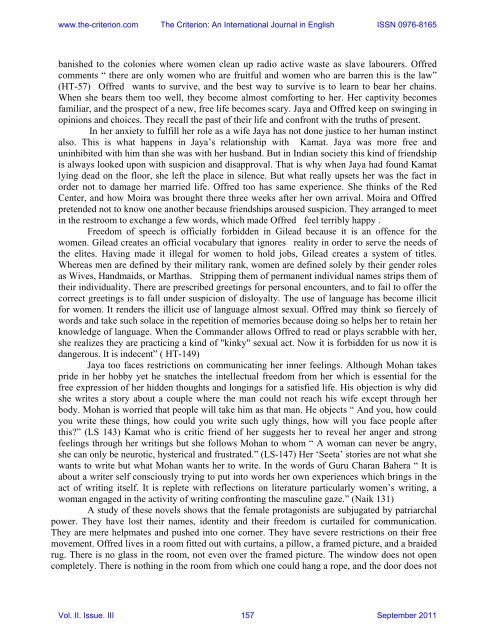Vol. II. Issue. III September 2011 - The Criterion: An International ...
Vol. II. Issue. III September 2011 - The Criterion: An International ...
Vol. II. Issue. III September 2011 - The Criterion: An International ...
You also want an ePaper? Increase the reach of your titles
YUMPU automatically turns print PDFs into web optimized ePapers that Google loves.
www.the-criterion.com <strong>The</strong> <strong>Criterion</strong>: <strong>An</strong> <strong>International</strong> Journal in English ISSN 0976-8165<br />
banished to the colonies where women clean up radio active waste as slave labourers. Offred<br />
comments “ there are only women who are fruitful and women who are barren this is the law”<br />
(HT-57) Offred wants to survive, and the best way to survive is to learn to bear her chains.<br />
When she bears them too well, they become almost comforting to her. Her captivity becomes<br />
familiar, and the prospect of a new, free life becomes scary. Jaya and Offred keep on swinging in<br />
opinions and choices. <strong>The</strong>y recall the past of their life and confront with the truths of present.<br />
In her anxiety to fulfill her role as a wife Jaya has not done justice to her human instinct<br />
also. This is what happens in Jaya’s relationship with Kamat. Jaya was more free and<br />
uninhibited with him than she was with her husband. But in Indian society this kind of friendship<br />
is always looked upon with suspicion and disapproval. That is why when Jaya had found Kamat<br />
lying dead on the floor, she left the place in silence. But what really upsets her was the fact in<br />
order not to damage her married life. Offred too has same experience. She thinks of the Red<br />
Center, and how Moira was brought there three weeks after her own arrival. Moira and Offred<br />
pretended not to know one another because friendships aroused suspicion. <strong>The</strong>y arranged to meet<br />
in the restroom<br />
to exchange a few words, which made Offred feel terribly happy .<br />
Freedom of speech is officially forbidden in Gilead because it is an offence for the<br />
women. Gilead creates an official vocabulary that ignores reality in order to serve the needs of<br />
the elites. Having made it illegal for women to hold jobs, Gilead creates a system of titles.<br />
Whereas men are defined by their military rank, women are defined solely by their gender roles<br />
as Wives, Handmaids, or Marthas. Stripping them of permanent individual names strips them of<br />
their individuality. <strong>The</strong>re are prescribed greetings for personal encounters, and to fail to offer the<br />
correct greetings is to fall under suspicion of disloyalty. <strong>The</strong> use of language has become illicit<br />
for women. It renders the illicit use of language almost sexual. Offred may think so fiercely of<br />
words and take such solace in the repetition of memories because doing so helps her to retain her<br />
knowledge of language. When the Commander allows Offred to read or plays scrabble with her,<br />
she realizes they are practicing a kind of "kinky" sexual act. Now it is forbidden for us now it is<br />
dangerous.<br />
It is indecent” ( HT-149)<br />
Jaya too faces restrictions on communicating her inner feelings. Although Mohan takes<br />
pride in her hobby yet he snatches the intellectual freedom from her which is essential for the<br />
free expression of her hidden thoughts and longings for a satisfied life. His objection is why did<br />
she writes a story about a couple where the man could not reach his wife except through her<br />
body. Mohan is worried that people will take him as that man. He objects “ <strong>An</strong>d you, how could<br />
you write these things, how could you write such ugly things, how will you face people after<br />
this?” (LS 143) Kamat who is critic friend of her suggests her to reveal her anger and strong<br />
feelings through her writings but she follows Mohan to whom “ A woman can never be angry,<br />
she can only be neurotic, hysterical and frustrated.” (LS-147) Her ‘Seeta’ stories are not what she<br />
wants to write but what Mohan wants her to write. In the words of Guru Charan Bahera “ It is<br />
about a writer self consciously trying to put into words her own experiences which brings in the<br />
act of writing itself. It is replete with reflections on literature particularly women’s writing,<br />
a<br />
w oman engaged in the activity of writing confronting the masculine gaze.” (Naik 131)<br />
A study of these novels shows that the female protagonists are subjugated by patriarchal<br />
power. <strong>The</strong>y have lost their names, identity and their freedom is curtailed for communication.<br />
<strong>The</strong>y are mere helpmates and pushed into one corner. <strong>The</strong>y have severe restrictions on their free<br />
movement. Offred lives in a room fitted out with curtains, a pillow, a framed picture, and a braided<br />
rug. <strong>The</strong>re is no glass in the room, not even over the framed picture. <strong>The</strong> window does not open<br />
completely. <strong>The</strong>re is nothing in the room from which one could hang a rope, and the door does not<br />
<strong>Vol</strong>. <strong>II</strong>. <strong>Issue</strong>. <strong>II</strong>I 157 <strong>September</strong> <strong>2011</strong>
















